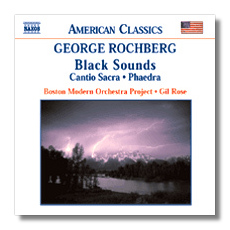
The Internet's Premier Classical Music Source
Related Links
- Rochberg Reviews
- Latest Reviews
- More Reviews
-
By Composer
-
Collections
DVD & Blu-ray
Books
Concert Reviews
Articles/Interviews
Software
Audio
Search Amazon
Recommended Links
Site News
 CD Review
CD Review
George Rochberg

- Black Sounds
- Cantio Sacra
- Phaedra
Mary Nessinger, mezzo-soprano
Boston Modern Orchestra Project/Gil Rose
Naxos 8.559120 DDD 73:59
Now in his ninth decade, American George Rochberg continues to confound music historians with that most troublesome of questions: how are we to classify him? After serving in World War Two – and through the influence of Schoenberg – his early neoclassical style was replaced by serialism. Then, in 1964, Rochberg's son died of cancer. Finding his current style of composition inadequate to express his grief, Rochberg rejected serialism, and began to introduce (or reintroduce) other musical styles into his work in a technique he called ars combinatoria. Since then, his compositions have been very eclectic, and stylistic variety is seen not just from one work to the next, but even within the same work.
It would be easy to convince most listeners that three different men composed the three works on this CD. Cantio Sacra, the oldest music here (1953), is Rochberg's transcription of Samuel Scheidt's variations on the chorale tune "Warum betrübst du dich, mein Herz?" As Rochberg is faithful to the spirit of Scheidt's Baroque original, this seems like an odd way to introduce Rochberg to a potentially large audience of new listeners. Nevertheless, it establishes, at least in part, the composer's artistic credo. In his booklet note for this release, Rochberg cites his love for the variation form, his appreciation of Baroque music's sobriety and intellectual rigor, and his freedom to choose freely between tonality and atonality as driving forces behind Cantio Sacra. So, although this work might not be typical of Rochberg superficially, it is typical on a deeper level.
Black Sounds, scored for seventeen winds, was written in 1965 for a dance piece called The Act. The "act" in question is murder, and Rochberg's jagged chromatic writing suits the subject; this is uncompromising music. Rochberg writes, "I also thought of it as an 'homage' to Varese, whom I admired greatly for his directness and power of dramatic expression." The resemblance to Varese's work is striking indeed.
The notes neglect to date Phaedra, the last work on this CD. Here's a subject that has inspired many composers. Like Britten, Rochberg takes his text from Robert Lowell's translation of Racine, although Britten and Rochberg use different excerpts. Lowell's English text is "direct, uncluttered, and unselfconscious," and Rochberg's word-setting and music are no less so. This is a grippingly dramatic monodrama in seven scenes for mezzo-soprano and orchestra. Here, the use of a tonal language diminishes the anguish of the title character's expression not one whit; if anything, it makes it all the more immediate and real to the listener. The subject might be horrible, but thanks to Rochberg, you can't take your ears off of it.
Fine performances are found throughout; special kudos are due to mezzo-soprano Mary Nessinger, whose excellent diction intensifies the laser-like intensity of her voice and the dramatic impact of Phaedra. Naxos includes the texts, but it was hardly necessary. The sympathetic recording venue was Jordan Hall at the New England Conservatory of Music.
I know it's a cliché, but there's something for almost everybody here. Chalk up another worthwhile release in Naxos' "American Classics" series. Why has this CD been "in the can" for more than four years?
Copyright © 2007, Raymond Tuttle




















